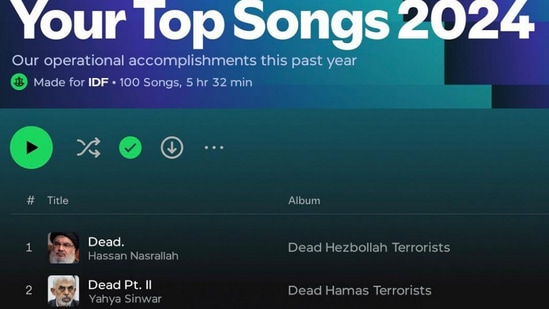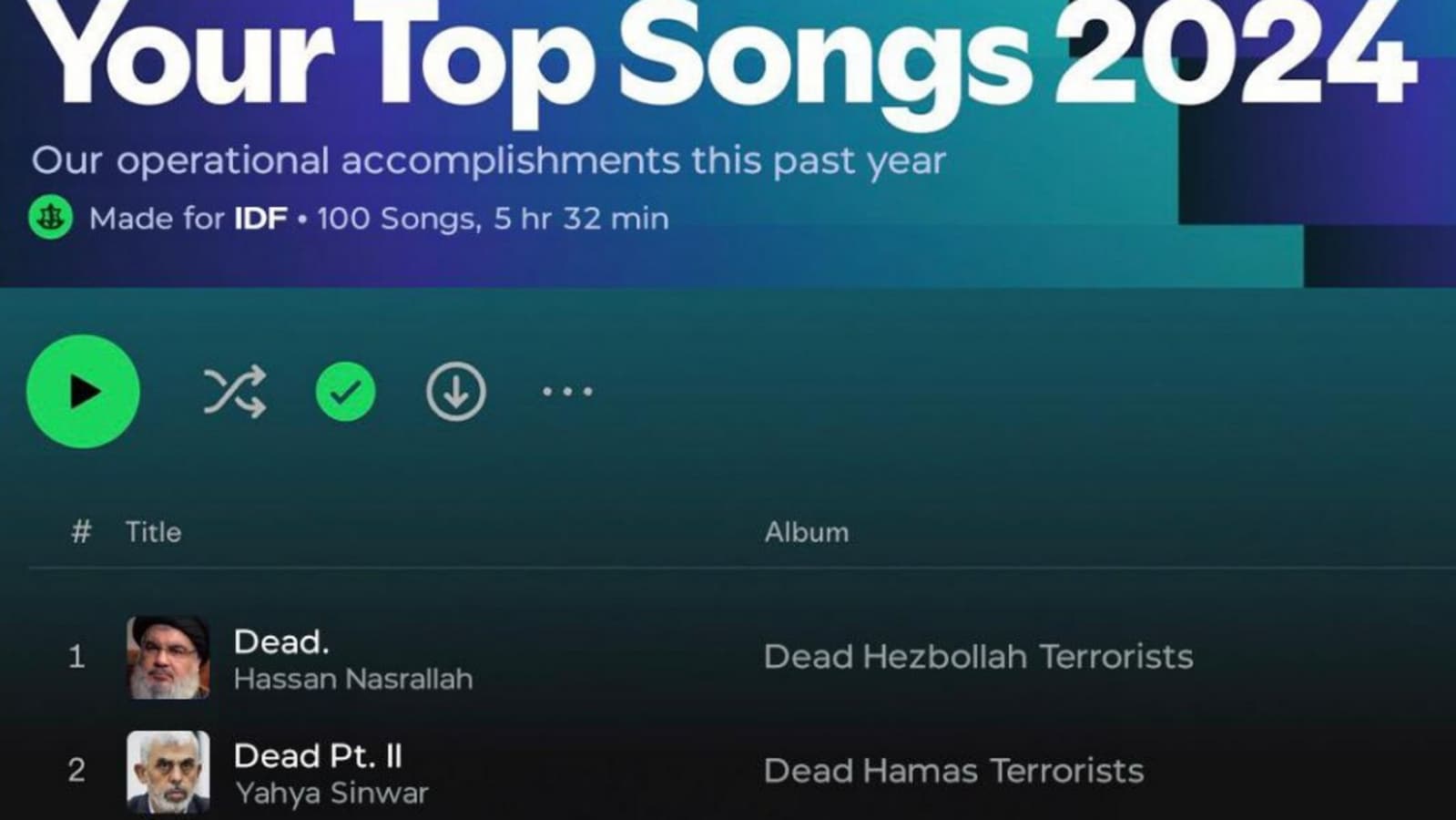Israel’s military on Thursday jumped on the trend of sharing screenshots from one’s Spotify wrapped list, which tells users which were the top songs and artists they listened to. But there was a twist: Israel Defence Forces’ Wrapped 2024 list featured the top Hamas and Hezbollah leaders they eliminated this year.
 IDF’s list, formatted like a song playlist, also included Israel’s efforts to eliminate “terrorists, dismantle Hezbollah structures, and protect civilians.”(X/IDF)
IDF’s list, formatted like a song playlist, also included Israel’s efforts to eliminate “terrorists, dismantle Hezbollah structures, and protect civilians.”(X/IDF)
IDF shared an image of the list on X (formerly Twitter), which highlighted Israel’s efforts to eliminate “terrorists, dismantle Hezbollah structures, and protect civilians.”
“Thought we would share our year, wrapped,” wrote the Israel Defense Forces (IDF) on X.
What is Spotify Wrapped?
Spotify Wrapped is the streaming service’s yearly overview of individual listening trends, along with global and national insights. Users get a breakdown of their top artists, songs, genres, albums, and podcasts, all wrapped up in an interactive presentation.
Since 2016, Spotify has been offering listeners detailed insights into their music preferences. Over the years, the campaign has grown into a massive event, becoming an internet sensation. Spotify even called its 2023 Wrapped the “biggest ever” in terms of audience reach and the range of data shared.
The campaign has become a social media sensation, as people share and compare their Wrapped data with their friends and followers online.
Wrapped gives listeners a variety of insights, such as whether they’re among an artist’s top listeners, along with a personalized playlist of their top 100 songs to save, share, and revisit when the nostalgia hits.
Spotify also curates playlists reflecting national and global listening trends, featuring the top-streamed artists and songs. In 2023, Taylor Swift claimed the title of Spotify’s most-streamed artist, dethroning Bad Bunny, who had held the title for three consecutive years. Swift maintained that top spot this year, followed by The Weeknd, Bad Bunny, Drake, and Billie Eilish.
Israel’s war against Hezbollah and Hamas
In September, Israel’s Air Force killed Hezbollah chief Hassan Nasrallah in a highly precise strike, which involved several intelligence agencies and meticulous planning. The attack occurred while Nasrallah and other leaders were meeting in a bunker in Beirut, Lebanon. The bombing, one of the largest on an urban centre in recent history, used around 80 tonnes of bombs to target the heavily fortified bunker over 60 feet underground. The strike also destroyed Hezbollah’s electronics and missile stockpiles. Nasrallah, linked by Israel to numerous deadly attacks on Israeli and Jewish targets, had been on Israel’s kill list for decades. His assassination has been most significant and impactful of Israel’s targeted killings in years, greatly escalating the regional conflict.
In October, the Israeli military confirmed the death of Hamas leader Yahya Sinwar, who was killed in a firefight after being tracked while moving “from home to home” in southern Gaza to avoid detection. Israel considered Sinwar’s death a major blow to Hamas, as he was believed to be behind the October 7, 2023, massacre that triggered the war.
The IDF confirmed that after a year-long pursuit, Sinwar was eliminated. They stated that multiple operations over the past year had limited his movements, leading to his eventual capture. Israel accuses Sinwar of masterminding the October 7 attacks, which resulted in the deaths of 1,206 people in Israel, mostly civilians.
Israel says it will ‘go to any lengths to protect civilians’
Israel has stated that it takes great lengths to protect civilians and adhere to international law, such as ordering evacuations before airstrikes and ground offensives.
The conflict began on October 7, 2023, when Hamas militants attacked southern Israel, killing around 1,200 people, mostly civilians, and taking roughly 250 hostages, including children and the elderly. About 100 hostages remain in Gaza, with at least a third believed to be dead.
Israel’s retaliatory military campaign has resulted in over 44,500 deaths, according to Gaza health officials, though their count does not distinguish between civilians and fighters. They report that more than half of those killed are women and children.
Amnesty International has accused Israel of committing genocide in Gaza, alleging that Israel has deliberately targeted Palestinians through deadly attacks, the destruction of essential infrastructure, and blocking aid deliveries such as food and medicine.
Last week, Israel agreed to a ceasefire with Hezbollah, halting the fighting between the two sides after nearly 14 months of cross-border conflict. The conflict began when Hezbollah fired on Israel in solidarity with Hamas following its assault on southern Israel.
Meanwhile, the war in Gaza continues, with only one ceasefire in the past year that lasted a week. The conflict with Hezbollah escalated after Israel launched a sophisticated attack that disabled Hezbollah’s communication systems, including pagers and walkie-talkies used by the fighters.
(With inputs from agencies)
